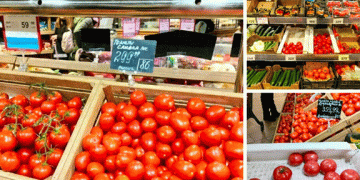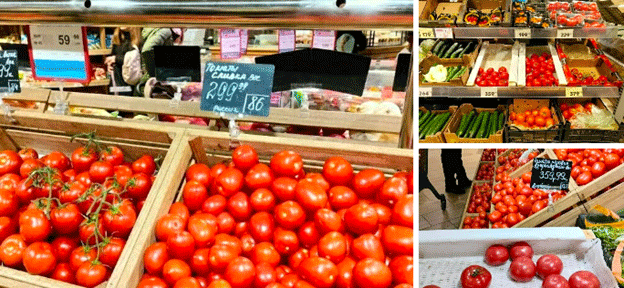Kaliningrad, Russia’s westernmost exclave, has long prided itself on its ability to provide fresh, locally grown produce to its residents. However, recent visits to local supermarkets reveal a stark reality: Kaliningrad’s tomatoes and cucumbers have vanished from the shelves. Shoppers have been left searching for alternatives—often unsatisfactory and expensive imported vegetables.
Local Shortages and Consumer Frustrations
Residents have voiced frustration over the disappearance of local vegetables. “My child can only eat yellow tomatoes due to allergies,” explained Anastasia, a Kaliningrad resident. “We used to always buy Gvardeyskie [local] tomatoes, but lately, they’ve disappeared from the shelves.” Shoppers have turned to imported alternatives, but these often come with high prices and poor quality. “The Turkish tomatoes are like eating glass—they’re inedible,” remarked one shopper. “They’re priced at nearly 300 rubles per kilogram, and they’re often moldy or spoiled.”
Imported Veggies Falling Short
The reliance on imported vegetables, especially from Turkey, has highlighted significant issues in quality and cost. “Imported products from Russia’s mainland are often bruised and wilted, also priced around 300 rubles per kilogram,” noted another shopper. The higher prices and lack of quality make it difficult for consumers to justify the expense. The situation is compounded by an inconsistent supply of vegetables, particularly during the winter months when local production should be more stable.
The Role of Greenhouses and Government Policy
Kaliningrad’s efforts to build its own greenhouse infrastructure have not yet provided the expected solution. The region’s greenhouses have struggled to meet the growing demand for local vegetables, exacerbated by the high costs of production and inadequate government support. “We used to import everything from Poland, and there were no issues with fresh produce,” commented one frustrated resident. “Now that we’ve invested in local greenhouses, the results are still lagging. Where are those promised local tomatoes and cucumbers?”
Kaliningrad’s agricultural landscape is facing a crisis in local vegetable production. The government’s push for self-sufficiency in food production through subsidies and greenhouse projects has yet to deliver on its promises. The challenge is not only about growing vegetables locally but also about ensuring they meet the quality and cost expectations of the consumers. As long as this gap persists, Kaliningrad will continue to struggle with providing fresh, affordable produce to its residents.































